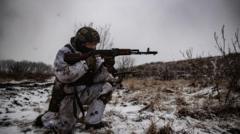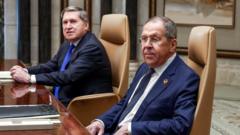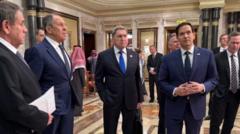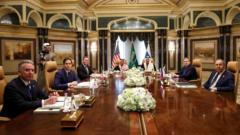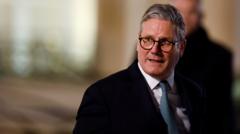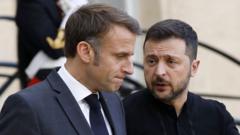As the conflict with Russia continues, Zelensky advocates for sovereignty in peace negotiations and warns against sidelining European interests.
**Zelensky Calls for European Army Amid Changing U.S. Relations**
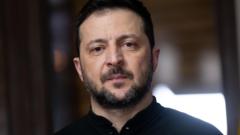
**Zelensky Calls for European Army Amid Changing U.S. Relations**
Ukrainian President emphasizes need for Europe to establish its military capabilities in light of U.S. withdrawal concerns.
In a pressing address at the Munich Security Conference, Ukrainian President Volodymyr Zelensky called for the establishment of an "army of Europe" to better prepare the continent against potential Russian aggression. His remarks came amid rising apprehensions surrounding the United States' commitments to European security, particularly after comments from U.S. Vice-President JD Vance indicating a shift in American support dynamics.
Zelensky expressed his dissatisfaction with the prospect of peace negotiations, highlighting that any agreements or talks involving Ukraine must include its presence, especially following recent discussions between Donald Trump and Vladimir Putin to explore peace initiatives. Reflecting on the call initiated on behalf of the U.S. Secretary of State Marco Rubio with the Russian Foreign Minister, Zelensky stressed that Ukraine cannot accept any backdoor deals that lack Ukrainian involvement.
The backdrop of these discussions is the ongoing conflict in Ukraine, approaching its third anniversary amidst changing geopolitical affiliations. Trump's recent dialogue with Putin marked a significant thaw in U.S.-Russia relations, stirring concerns among Ukraine and European partners regarding their roles in potential resolutions. The notion proposed by Trump's special envoy that Europe would be merely consulted but not directly involved in U.S.-Russia negotiations was particularly alarming for Zelensky, underscoring a need for unity in European military strategies.
Zelensky adamantly opposed a previous Trump-led proposal which would have allowed the U.S. access to Ukraine's abundant natural resources without substantial security guarantees for Ukraine, implying a lack of responsibility and partnership from the U.S. Moreover, he highlighted the urgent need for Europe to establish its military framework, pointing to past advocates like French President Emmanuel Macron, who have previously pushed for a collective European defense mechanism.
Despite the insistence on reforms, the EU’s foreign policy chief Kaja Kallas promptly rejected the idea of a European army, emphasizing ongoing dependency on U.S. support. As geopolitical tensions mount, Zelensky acknowledged that many leaders are re-evaluating the security landscape in Europe and the role the U.S. plays in it, remarking, "The old days are over when America supported Europe just because it always had."
Furthermore, Zelensky reaffirmed Ukraine's aspiration for NATO membership as vital for its defense, despite statements from key U.S. officials suggesting that Ukraine's joining of the alliance and a return to pre-2014 borders appear increasingly unrealistic. He insisted that Ukraine should always maintain its presence in crucial decision-making regarding its future, urging a unified European stance on matters of security and diplomatic discussions with Russia.
In summary, Zelensky's calls and the current geopolitical shifts underscore a critical juncture for Europe and Ukraine, as they navigate new paths toward self-reliance and collaborative defense strategies in an uncertain international environment.
Zelensky expressed his dissatisfaction with the prospect of peace negotiations, highlighting that any agreements or talks involving Ukraine must include its presence, especially following recent discussions between Donald Trump and Vladimir Putin to explore peace initiatives. Reflecting on the call initiated on behalf of the U.S. Secretary of State Marco Rubio with the Russian Foreign Minister, Zelensky stressed that Ukraine cannot accept any backdoor deals that lack Ukrainian involvement.
The backdrop of these discussions is the ongoing conflict in Ukraine, approaching its third anniversary amidst changing geopolitical affiliations. Trump's recent dialogue with Putin marked a significant thaw in U.S.-Russia relations, stirring concerns among Ukraine and European partners regarding their roles in potential resolutions. The notion proposed by Trump's special envoy that Europe would be merely consulted but not directly involved in U.S.-Russia negotiations was particularly alarming for Zelensky, underscoring a need for unity in European military strategies.
Zelensky adamantly opposed a previous Trump-led proposal which would have allowed the U.S. access to Ukraine's abundant natural resources without substantial security guarantees for Ukraine, implying a lack of responsibility and partnership from the U.S. Moreover, he highlighted the urgent need for Europe to establish its military framework, pointing to past advocates like French President Emmanuel Macron, who have previously pushed for a collective European defense mechanism.
Despite the insistence on reforms, the EU’s foreign policy chief Kaja Kallas promptly rejected the idea of a European army, emphasizing ongoing dependency on U.S. support. As geopolitical tensions mount, Zelensky acknowledged that many leaders are re-evaluating the security landscape in Europe and the role the U.S. plays in it, remarking, "The old days are over when America supported Europe just because it always had."
Furthermore, Zelensky reaffirmed Ukraine's aspiration for NATO membership as vital for its defense, despite statements from key U.S. officials suggesting that Ukraine's joining of the alliance and a return to pre-2014 borders appear increasingly unrealistic. He insisted that Ukraine should always maintain its presence in crucial decision-making regarding its future, urging a unified European stance on matters of security and diplomatic discussions with Russia.
In summary, Zelensky's calls and the current geopolitical shifts underscore a critical juncture for Europe and Ukraine, as they navigate new paths toward self-reliance and collaborative defense strategies in an uncertain international environment.


